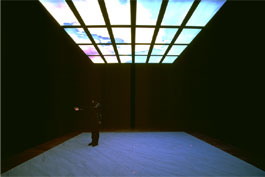|
|
|
||||||
|
|
|||||||
|
Transgression is an action which involves the limit,
The origins of language lie in the utterance, an enunciative act that violently disrupts the harmony of nature. But at the moment when the senses are overcome by language, our consciousness produces a counterfeit world, one that appears to have existed previously. With language comes the experience of the infinite fastenings of memory: "mother's face", "lover's voice", "the blue of the sky". Yet, even here, with the form it has furnished for itself, language itself is continuously constituted by that which cannot intrinsically be represented. In this manner, language ceases its exposure of the infinite and puts in place, within an empty space, limits that it must violate. Now, because of language's very depth we experience both finitude and existence. There is no mystery to be found therein. For it is there, in the movement along that narrow border, that the body of language and its origin are revealed as a trace. In locating and marking a certain moment within the reverent joy of solitude as a death of sorts, the secret language of prayer in its unceasing enunciation of touching on that which is absent, creates in this instant, a moment whereby that which is absent comes into being without delay. Within each and every word, language operates by returning thought back toward that limit of the issue of its own substantiality; it points at that finitude from afar, again and again. And this itself is mystery. |
||
 |
In Language, Counter-Memory, Practice: Selected Essays and Interviews, ed. Donald F. Bouchard (Ithaca: Cornell University Press, 1977): 33-34. |
|